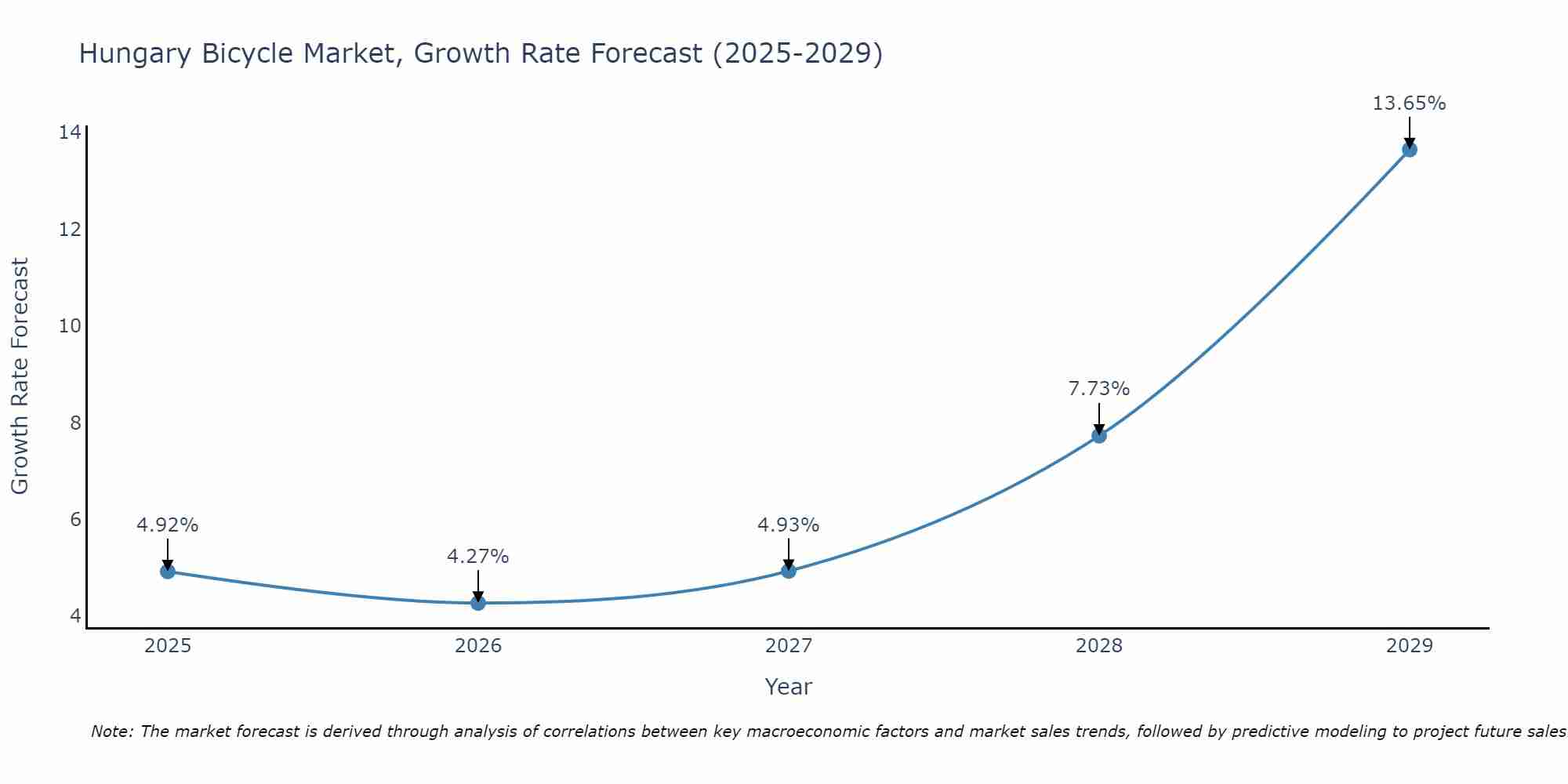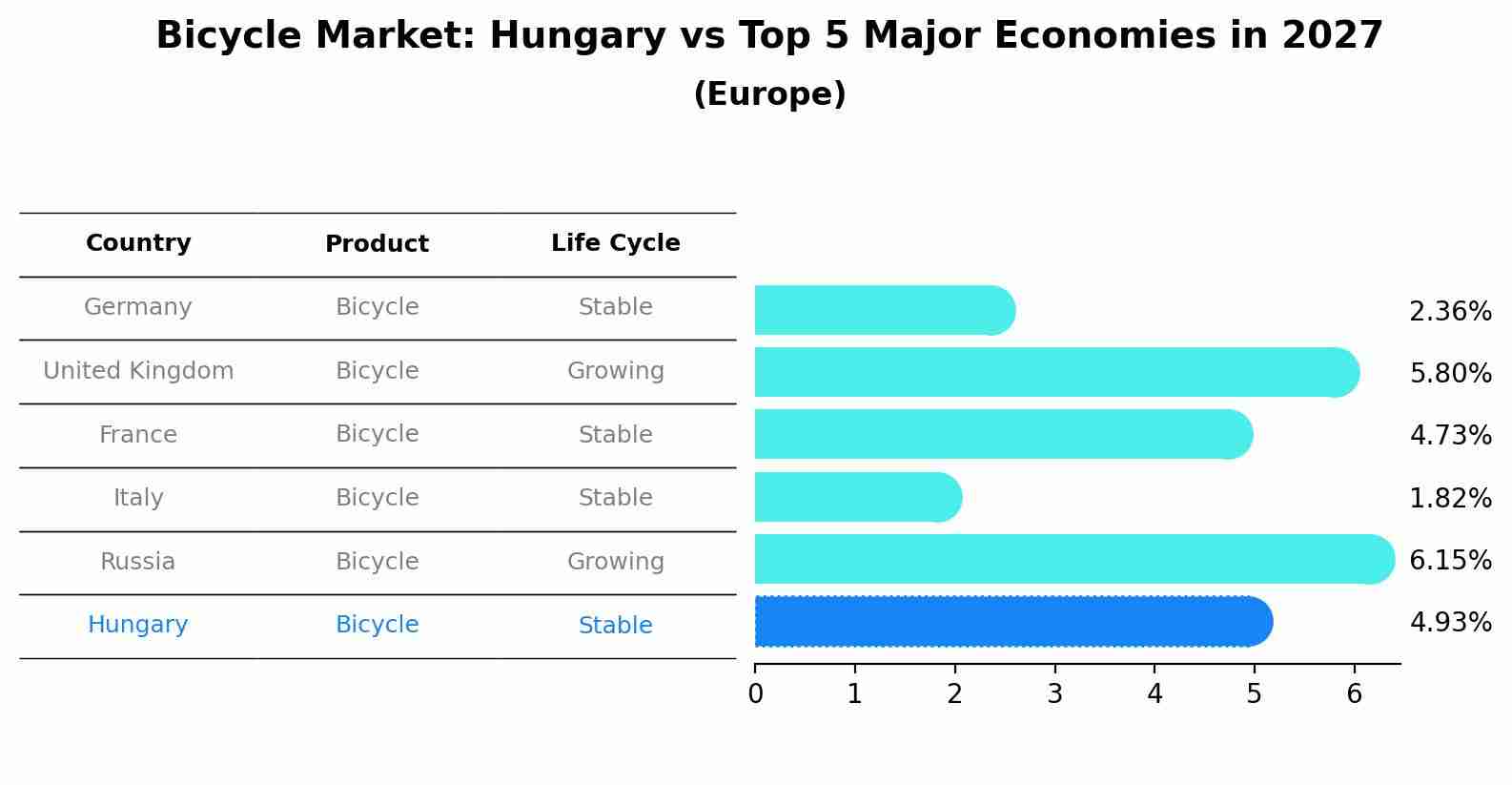Hungary Bicycle Market Outlook | Revenue, Analysis, Share, Trends, Value, Companies, Industry, Size, Growth, COVID-19 IMPACT & Forecast
| Product Code: ETC362119 | Publication Date: Aug 2022 | Updated Date: Aug 2025 | Product Type: Market Research Report | |
| Publisher: 6Wresearch | Author: Ravi Bhandari | No. of Pages: 75 | No. of Figures: 35 | No. of Tables: 20 |
Hungary Bicycle Market Size Growth Rate
The Hungary Bicycle Market is projected to witness mixed growth rate patterns during 2025 to 2029. From 4.92% in 2025, the growth rate steadily ascends to 13.65% in 2029.

Bicycle Market: Hungary vs Top 5 Major Economies in 2027 (Europe)
The Bicycle market in Hungary is projected to grow at a stable growth rate of 4.93% by 2027, within the Europe region led by Germany, along with other countries like United Kingdom, France, Italy and Russia, collectively shaping a dynamic and evolving market environment driven by innovation and increasing adoption of emerging technologies.

Hungary Bicycle Market Synopsis
The Hungary bicycle market is experiencing steady growth driven by factors such as increasing health and environmental consciousness among consumers, rising demand for alternative modes of transportation, and government initiatives to promote cycling infrastructure. The market is characterized by a mix of domestic and international players offering a variety of bicycles ranging from traditional city bikes to high-end electric models. Key trends include a shift towards e-bikes due to their convenience and eco-friendliness, as well as a growing interest in cycling as a recreational and fitness activity. Despite facing challenges such as limited cycling infrastructure in certain regions and competition from other modes of transportation, the Hungary bicycle market is expected to continue its positive trajectory with opportunities for further expansion and innovation in the coming years.
Hungary Bicycle Market Trends
The Hungary Bicycle Market is experiencing a notable shift towards electric bicycles, driven by increasing awareness of environmental sustainability and the desire for convenient and efficient transportation options. E-bikes are gaining popularity among commuters and leisure cyclists due to their ability to provide pedal assistance, making cycling easier and more accessible to a wider range of people. Additionally, there is a growing interest in high-quality, premium bicycles among enthusiasts who value performance and design. The market is also witnessing a rise in the popularity of cycling as a recreational activity, leading to increased sales of mountain bikes and road bikes. Overall, the Hungary Bicycle Market is evolving to cater to diverse consumer preferences, with a focus on technology, sustainability, and lifestyle factors driving purchasing decisions.
Hungary Bicycle Market Challenges
In the Hungary Bicycle Market, some of the key challenges faced include increasing competition from both domestic and international brands, fluctuating raw material prices affecting production costs, and changing consumer preferences towards electric bicycles and other alternative modes of transportation. Additionally, infrastructure limitations such as inadequate bike lanes and parking facilities in urban areas pose challenges for promoting cycling as a popular mode of transportation. Economic uncertainties and potential impact of regulatory changes on the industry also contribute to the challenges faced by players in the Hungary Bicycle Market. Overall, addressing these challenges will require strategic investments in innovation, marketing, and infrastructure development to sustain and grow the market in the face of evolving trends and competition.
Hungary Bicycle Market Investment Opportunities
The Hungary bicycle market presents various investment opportunities for both local and international investors. With the increasing focus on sustainability and health-conscious lifestyles, the demand for bicycles in Hungary is on the rise. There is potential for investment in manufacturing facilities to meet the growing demand for bicycles, as well as in expanding distribution networks to reach a wider customer base. Additionally, there is room for innovation in terms of technology and design to cater to the evolving preferences of consumers. Investing in the bicycle market in Hungary could also include opportunities in related sectors such as accessories, maintenance services, and e-bikes. Overall, the market offers a promising landscape for investors looking to capitalize on the growing popularity of cycling in the country.
Jordan Agar Market Government Policies
Government policies related to the Hungary Bicycle Market aim to promote cycling as a sustainable and environmentally friendly mode of transportation. Initiatives include the development of cycling infrastructure such as bike lanes and parking facilities, as well as subsidies and incentives for the purchase of bicycles and electric bikes. Additionally, there are regulations in place to ensure the safety of cyclists on the roads, such as helmet requirements and rules for sharing the road with other vehicles. The government also supports cycling tourism to boost local economies and promote healthy lifestyles. Overall, these policies demonstrate a commitment to fostering a cycling-friendly environment in Hungary and encouraging more people to choose bicycles as a means of transportation.
Hungary Bicycle Market Future Outlook
The future outlook for the Hungary Bicycle Market appears positive and promising. This can be attributed to several factors such as increasing awareness of health and environmental benefits associated with cycling, growing interest in outdoor recreational activities, and government initiatives promoting sustainable transportation options. Additionally, the rise of electric bikes and advancements in technology are expected to drive further growth in the market. With a focus on eco-friendly and active lifestyles, the demand for bicycles in Hungary is likely to continue expanding, presenting opportunities for manufacturers, retailers, and related industries to thrive in the upcoming years.
Key Highlights of the Report:
- Hungary Bicycle Market Outlook
- Market Size of Hungary Bicycle Market, 2021
- Forecast of Hungary Bicycle Market, 2031
- Historical Data and Forecast of Hungary Bicycle Revenues & Volume for the Period 2018 - 2031
- Hungary Bicycle Market Trend Evolution
- Hungary Bicycle Market Drivers and Challenges
- Hungary Bicycle Price Trends
- Hungary Bicycle Porter's Five Forces
- Hungary Bicycle Industry Life Cycle
- Historical Data and Forecast of Hungary Bicycle Market Revenues & Volume By Product for the Period 2018 - 2031
- Historical Data and Forecast of Hungary Bicycle Market Revenues & Volume By Mountain Bikes for the Period 2018 - 2031
- Historical Data and Forecast of Hungary Bicycle Market Revenues & Volume By Hybrid Bikes for the Period 2018 - 2031
- Historical Data and Forecast of Hungary Bicycle Market Revenues & Volume By Road Bikes for the Period 2018 - 2031
- Historical Data and Forecast of Hungary Bicycle Market Revenues & Volume By Cargo Bikes for the Period 2018 - 2031
- Historical Data and Forecast of Hungary Bicycle Market Revenues & Volume By Others for the Period 2018 - 2031
- Historical Data and Forecast of Hungary Bicycle Market Revenues & Volume By Technology for the Period 2018 - 2031
- Historical Data and Forecast of Hungary Bicycle Market Revenues & Volume By Electric for the Period 2018 - 2031
- Historical Data and Forecast of Hungary Bicycle Market Revenues & Volume By Conventional for the Period 2018 - 2031
- Historical Data and Forecast of Hungary Bicycle Market Revenues & Volume By End-user for the Period 2018 - 2031
- Historical Data and Forecast of Hungary Bicycle Market Revenues & Volume By Men for the Period 2018 - 2031
- Historical Data and Forecast of Hungary Bicycle Market Revenues & Volume By Women for the Period 2018 - 2031
- Historical Data and Forecast of Hungary Bicycle Market Revenues & Volume By Kids for the Period 2018 - 2031
- Historical Data and Forecast of Hungary Bicycle Market Revenues & Volume By Distribution Channel for the Period 2018 - 2031
- Historical Data and Forecast of Hungary Bicycle Market Revenues & Volume By Online for the Period 2018 - 2031
- Historical Data and Forecast of Hungary Bicycle Market Revenues & Volume By Offline for the Period 2018 - 2031
- Hungary Bicycle Import Export Trade Statistics
- Market Opportunity Assessment By Product
- Market Opportunity Assessment By Technology
- Market Opportunity Assessment By End-user
- Market Opportunity Assessment By Distribution Channel
- Hungary Bicycle Top Companies Market Share
- Hungary Bicycle Competitive Benchmarking By Technical and Operational Parameters
- Hungary Bicycle Company Profiles
- Hungary Bicycle Key Strategic Recommendations
Frequently Asked Questions About the Market Study (FAQs):
- Single User License$ 1,995
- Department License$ 2,400
- Site License$ 3,120
- Global License$ 3,795
Search
Thought Leadership and Analyst Meet
Our Clients
Related Reports
- Germany Breakfast Food Market (2026-2032) | Industry, Share, Growth, Size, Companies, Value, Analysis, Revenue, Trends, Forecast & Outlook
- Australia Briquette Market (2025-2031) | Growth, Size, Revenue, Forecast, Analysis, Trends, Value, Share, Industry & Companies
- Vietnam System Integrator Market (2025-2031) | Size, Companies, Analysis, Industry, Value, Forecast, Growth, Trends, Revenue & Share
- ASEAN and Thailand Brain Health Supplements Market (2025-2031) | Strategy, Consumer Insights, Analysis, Investment Trends, Opportunities, Growth, Size, Share, Industry, Revenue, Segments, Value, Segmentation, Supply, Forecast, Restraints, Outlook, Competition, Drivers, Trends, Demand, Pricing Analysis, Competitive, Strategic Insights, Companies, Challenges
- ASEAN Bearings Market (2025-2031) | Strategy, Consumer Insights, Analysis, Investment Trends, Opportunities, Growth, Size, Share, Industry, Revenue, Segments, Value, Segmentation, Supply, Forecast, Restraints, Outlook, Competition, Drivers, Trends, Demand, Pricing Analysis, Competitive, Strategic Insights, Companies, Challenges
- Europe Flooring Market (2025-2031) | Outlook, Share, Industry, Trends, Forecast, Companies, Revenue, Size, Analysis, Growth & Value
- Saudi Arabia Manlift Market (2025-2031) | Outlook, Size, Growth, Trends, Companies, Industry, Revenue, Value, Share, Forecast & Analysis
- Uganda Excavator, Crane, and Wheel Loaders Market (2025-2031) | Strategy, Consumer Insights, Analysis, Investment Trends, Opportunities, Growth, Size, Share, Industry, Revenue, Segments, Value, Segmentation, Supply, Forecast, Restraints, Outlook, Competition, Drivers, Trends, Demand, Pricing Analysis, Competitive, Strategic Insights, Companies, Challenges
- Rwanda Excavator, Crane, and Wheel Loaders Market (2025-2031) | Strategy, Consumer Insights, Analysis, Investment Trends, Opportunities, Growth, Size, Share, Industry, Revenue, Segments, Value, Segmentation, Supply, Forecast, Restraints, Outlook, Competition, Drivers, Trends, Demand, Pricing Analysis, Competitive, Strategic Insights, Companies, Challenges
- Kenya Excavator, Crane, and Wheel Loaders Market (2025-2031) | Strategy, Consumer Insights, Analysis, Investment Trends, Opportunities, Growth, Size, Share, Industry, Revenue, Segments, Value, Segmentation, Supply, Forecast, Restraints, Outlook, Competition, Drivers, Trends, Demand, Pricing Analysis, Competitive, Strategic Insights, Companies, Challenges
Industry Events and Analyst Meet
Whitepaper
- Middle East & Africa Commercial Security Market Click here to view more.
- Middle East & Africa Fire Safety Systems & Equipment Market Click here to view more.
- GCC Drone Market Click here to view more.
- Middle East Lighting Fixture Market Click here to view more.
- GCC Physical & Perimeter Security Market Click here to view more.
6WResearch In News
- Doha a strategic location for EV manufacturing hub: IPA Qatar
- Demand for luxury TVs surging in the GCC, says Samsung
- Empowering Growth: The Thriving Journey of Bangladesh’s Cable Industry
- Demand for luxury TVs surging in the GCC, says Samsung
- Video call with a traditional healer? Once unthinkable, it’s now common in South Africa
- Intelligent Buildings To Smooth GCC’s Path To Net Zero


















